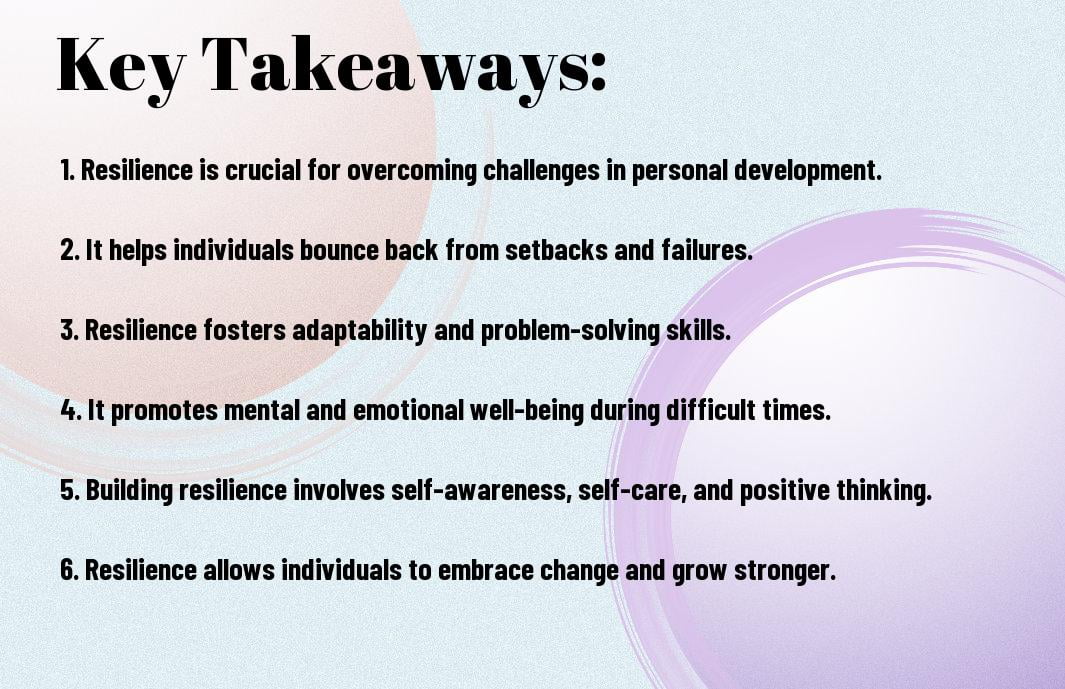#Role resilience plays a crucial part in personal development, helping individuals navigate through life’s challenges with strength and adaptability. By developing resilience skills, individuals can bounce back from setbacks, grow stronger in the face of adversity, and thrive in their personal and professional lives. Understanding the significance of resilience is necessary in fostering mental toughness and building a positive mindset necessary for personal growth and success.
Key Takeaways:
- Resilience is crucial for overcoming challenges: Resilience allows individuals to navigate setbacks, failures, and obstacles with a positive attitude, adaptability, and determination.
- Resilience fosters growth and development: By building resilience, individuals can develop coping mechanisms, problem-solving skills, and emotional intelligence, leading to personal growth and self-improvement.
- Resilience enhances mental well-being: Having a resilient mindset can help reduce stress, anxiety, and depression, improving overall mental health and well-being.
Understanding Resilience
Definitions and Key Concepts
Before delving into the role resilience plays in personal development, it is necessary to understand the concept itself. Resilience is the ability to bounce back from difficult experiences and adapt positively to adversity. It involves having the strength to cope with stress and overcome challenges.
Factors Contributing to Resilience
One of the key aspects of personal development is understanding the factors that contribute to resilience. Factors contributing to resilience include social support, positive relationships, self-esteem, coping skills, and problem-solving abilities. These factors can help individuals navigate tough situations and come out stronger on the other side. Thou.
- Social support: Having a strong support system can provide comfort and encouragement during difficult times.
- Positive relationships: Surrounding oneself with positive influences can help build emotional resilience.
- Self-esteem: Believing in oneself and one’s abilities is crucial for overcoming challenges.
- Coping skills: Developing healthy coping mechanisms can aid in managing stress and setbacks effectively.
- Problem-solving abilities: Being able to approach problems with a solution-oriented mindset is key to resilience.
Contributing Factors Explained
Contributing factors such as social support and positive relationships play a crucial role in building resilience as they provide a sense of belonging and connection, which can buffer against the effects of stress. Developing one’s self-esteem and honing effective coping skills help in facing challenges head-on and bouncing back from setbacks. Additionally, having strong problem-solving abilities allows individuals to navigate hurdles with confidence and determination. Thou.

The Impact of Resilience on Personal Growth
Enhancing Emotional Well-being
To truly grow as an individual, resilience plays a pivotal role in enhancing emotional well-being. Resilience helps individuals navigate through life’s challenges with a positive mindset, allowing them to bounce back from setbacks and hardships. It enables individuals to manage stress effectively and maintain emotional stability in the face of adversity.
Fostering Mental Strength
Mental strength is a key component of personal growth, and resilience is the cornerstone in fostering this strength. Resilience equips individuals with the ability to adapt to difficult situations, think more clearly under pressure, and persevere in the face of obstacles. It empowers individuals to confront their fears, overcome self-doubt, and build confidence in their capabilities.
With resilience, individuals can develop a growth mindset, cultivate perseverance, and build the mental toughness needed to thrive in challenging environments. It enables individuals to embrace failures as learning opportunities, leading to continuous self-improvement and personal development.
Building Resilience
Your journey towards personal development is greatly influenced by your ability to build resilience. Resilience acts as a shield against the challenges and setbacks you may encounter along the way, allowing you to bounce back stronger each time.
Practical Strategies and Techniques
Strategies such as practicing mindfulness, setting realistic goals, and maintaining a positive mindset can help enhance your resilience. Engaging in regular physical exercise, adopting a problem-solving approach to difficulties, and seeking opportunities for personal growth are also effective techniques to build resilience.
Role of Support Systems and Community
Systems including friends, family, mentors, and community networks play a crucial role in bolstering your resilience. Their encouragement, guidance, and emotional support can provide you with the strength and resources needed to navigate challenges and setbacks successfully.
With strong support systems and a sense of community, you are not alone in your personal development journey. Surrounding yourself with positive, understanding individuals who uplift and motivate you can significantly impact your ability to cultivate resilience and achieve your goals.
Resilience in Different Life Stages
All Resilience: Characteristics and Examples, irrespective of age, plays a crucial role in personal development. How individuals develop resilience, however, may vary depending on the life stage they are in.
Childhood and Adolescence
Different challenges in childhood and adolescence can shape resilience. Adolescents often face issues such as peer pressure, academic stress, and identity development. Building resilience during this stage involves learning to cope with failure, developing problem-solving skills, and building a support network of friends and family.
Adulthood and Senior Years
Senior Adulthood and the senior years bring their own set of challenges, including health issues, retirement, and loss. Resilience in this stage means adapting to changes, maintaining a positive outlook, and seeking support when needed. It also involves finding new purposes and activities that bring joy and fulfillment.

Summing up
Drawing together the pieces, resilience is a crucial factor in personal development. It helps individuals overcome challenges, bounce back from setbacks, and adapt to change. By cultivating resilience, people can build a strong foundation for personal growth and well-being. It enables them to face adversity with courage, maintain a positive outlook, and keep moving forward towards their goals. Ultimately, resilience plays a significant role in shaping an individual’s character and capabilities, allowing them to thrive in the face of life’s uncertainties.
FAQ
Q: What is resilience in the context of personal development?
A: Resilience in personal development refers to the ability to adapt and bounce back in the face of adversity, challenges, and significant life changes. It involves emotional strength, flexibility, and the capacity to cope with stress in a healthy way.
Q: How does resilience contribute to personal growth and development?
A: Resilience plays a crucial role in personal development by empowering individuals to overcome obstacles, learn from setbacks, and build stronger coping mechanisms. It fosters mental toughness, perseverance, and a positive outlook on life, which are vital for achieving goals and fulfilling potential.
What are some strategies for building resilience in personal development?
A: Some effective strategies for enhancing resilience in personal development include cultivating a supportive social network, practicing self-care and self-compassion, developing problem-solving skills, staying optimistic, and maintaining a sense of purpose and perspective. Mindfulness, cognitive reframing, and seeking help from a therapist or coach can also help strengthen resilience.




